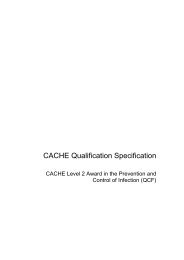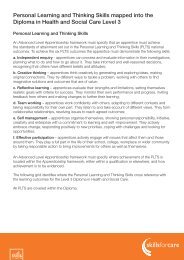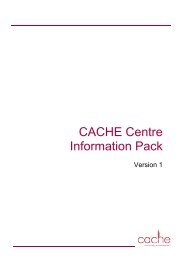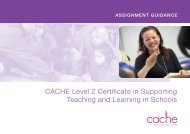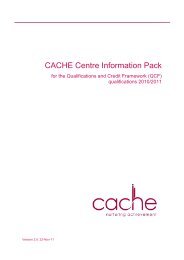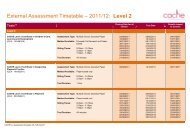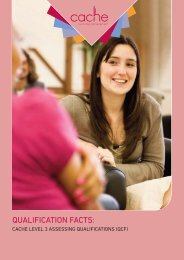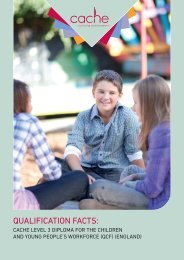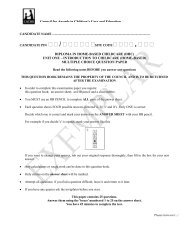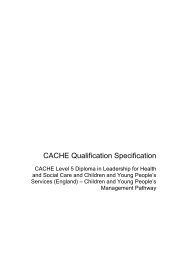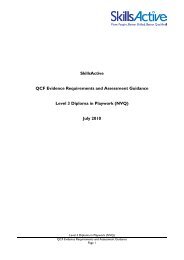Paediatric First Aid Guidance - Cache
Paediatric First Aid Guidance - Cache
Paediatric First Aid Guidance - Cache
Create successful ePaper yourself
Turn your PDF publications into a flip-book with our unique Google optimized e-Paper software.
CACHE <strong>Paediatric</strong> <strong>First</strong> <strong>Aid</strong> Additional <strong>Guidance</strong><br />
Publication History<br />
Please note: the following amendments were made to this guidance document in February 2012:<br />
p.2, <strong>Paediatric</strong> <strong>First</strong> <strong>Aid</strong> Providers please note the EYFS requirements: This section has been<br />
added.<br />
p.4, Requirements of trainers: Exemptions to PFA certificate requirements have been added.<br />
Level 2 <strong>Paediatric</strong> <strong>First</strong> <strong>Aid</strong> units in the QCF<br />
There are two Level 2 paediatric first aid units included within the Level 2 Certificate for the Children and Young<br />
People’s Workforce (CYPW) QCF qualification.<br />
<br />
<br />
F/600/2036 – <strong>Paediatric</strong> Emergency <strong>First</strong> <strong>Aid</strong><br />
J/600/2037 – Managing <strong>Paediatric</strong> Illness and Injury<br />
The decision to include them in the CYPW qualification, and specifically in the Level 2 Certificate rather than in the<br />
Level 3 Diploma CYPW qualification, was made by the Children’s Workforce Development Council (CWDC).<br />
Where learners are taking the units as part of the Level 2 Certificate CYPW qualification, CACHE and other awarding<br />
organisations will recognise achievement of the units as evidence of competence paediatric first aid. This means that<br />
when assessors are deeming learners competent in these paediatric first aid units, they are giving them a ‘licence to<br />
practise’ which will allow them to deliver first aid to a child in their care without supervision.<br />
If learners want separate certification for the CACHE Level 2 Award in <strong>Paediatric</strong> <strong>First</strong> <strong>Aid</strong> qualification, they would<br />
need to additionally register with CACHE for this. A fee would apply in accordance with the current fees list published<br />
on <strong>Cache</strong>zone. Learners would not be required to repeat the learning, but to meet first aid guidelines would need to<br />
renew their qualification every three years.<br />
In both the case of the 2 units within the L2 CYPW qualification and the standalone level 2 Award when completing the<br />
units there must be no more that a three month gap between the completion of each unit.<br />
Standalone Qualification - CACHE Level 2 Award in <strong>Paediatric</strong> <strong>First</strong> <strong>Aid</strong><br />
The two units can also be taken together as a standalone paediatric first aid qualification. CACHE offers this full<br />
qualification, the CACHE Level 2 Award in <strong>Paediatric</strong> <strong>First</strong> <strong>Aid</strong>.<br />
The qualification has the agreed regulatory purpose of “confirm occupational competence and /or licence to practise”.<br />
It has a minimum GLH of 20 and a credit of 2. It is offered in England, Wales and Northern Ireland.<br />
When both units are completed CACHE Level 2 <strong>Paediatric</strong> <strong>First</strong> <strong>Aid</strong> meets the requirements laid down by DFES Early<br />
Years Foundation Stage 2007.<br />
Some elements of the qualification must be assessed by observing the learner carrying out a practical demonstration of<br />
competencies on infant and child manikins, such as CPR, dealing with severe choking and recovery positions. Other<br />
elements are knowledge based and do not have to be observed practically.<br />
v3.0 Page 1 of 6
This qualification is valid for 3 years from the date on the certificate. This information will appear on the certificate for<br />
the CACHE Level 2 Award in <strong>Paediatric</strong> <strong>First</strong> <strong>Aid</strong>.<br />
It is a principle of the Qualifications and Credit Framework that credit for learning can only be gained once. Therefore,<br />
where this qualification is repeated for renewal purposes, a certificate will be provided but no further credit will be<br />
gained.<br />
<strong>Paediatric</strong> <strong>First</strong> <strong>Aid</strong> Providers please note the EYFS requirements<br />
The (EYFS) Early Years Foundation Stage has a section which relates to <strong>Paediatric</strong> <strong>First</strong> <strong>Aid</strong>. It states that courses<br />
must be approved by the Local Authority in whose area the early years provision is located. If you have not already<br />
done so we suggest that you contact your Local Authority to seek approval.<br />
Learner Evidence of Prior Achievement<br />
No Current Equivalencies<br />
St John’s, Red Cross and St Andrews accredited training courses are not on the NQF framework and so cannot be<br />
used as ‘equivalencies’ within QCF.<br />
No Current Exemptions<br />
St John’s, Red Cross and St Andrews accredited training courses are not QCF qualifications and so cannot be used as<br />
‘exemptions’.<br />
Recognition of Prior Learning (RPL)<br />
RPL in the QCF<br />
“A method of assessment (leading to the award of credit) that considers whether a learner can demonstrate that they<br />
can meet the assessment requirements for a unit through knowledge, understanding or skills they already possess<br />
and do not need to develop through a course of learning.”<br />
RPL is an alternative route to recognition and not a short cut. RPL must therefore be an integrated part of a qualityassured<br />
assessment process. Using any St John’s, Red Cross or St Andrews accredited training as RPL towards the<br />
two paediatric first aid units, Organisations wishing to use RPL for the <strong>Paediatric</strong> <strong>First</strong> <strong>Aid</strong> level two units, must ensure<br />
that the content of the course meets the learning outcomes of each unit. Where learning outcomes are not fully met<br />
they may be covered by written questions or professional discussion. This must be carried out by a qualified assessor<br />
who is occupationally competent.<br />
In other words, the learner being assessed for credits through RPL must still comply with all the standards and<br />
requirements as stated within the QCF units, including the learning outcome, the assessment criteria and any<br />
additional information provided within the unit in relation to sector assessment strategies and principles.<br />
Centres would need to retain documentary evidence of the assessment and internal quality assurance of every<br />
individual using RPL as an assessment method to be monitored by their Centre Advisor. The assessor would also need<br />
to meet the requirements of assessors listed below.<br />
However centres must ensure that the <strong>Paediatric</strong> <strong>First</strong> <strong>Aid</strong> learning to be RPL’d was delivered by an appropriate<br />
qualified <strong>Paediatric</strong> <strong>First</strong> <strong>Aid</strong> trainer who meets the appropriate criteria.<br />
v3.0 Page 2 of 6
Requirements of Assessors<br />
When using this guidance, Centres should additionally refer to the CACHE publication ‘A Guide to … the Requirements<br />
of Assessors and Internal Quality Assurers for CACHE QCF Qualifications’ which is available on <strong>Cache</strong>zone.<br />
In summary, there are three requirements of assessors of these units. These apply regardless of whether the assessor<br />
is a Centre member of staff or a representative from a voluntary organisation such as St Johns, Red Cross or St<br />
Andrews. They must as a minimum:<br />
1. be qualified to make assessment decisions<br />
2. hold a current and valid <strong>Paediatric</strong> <strong>First</strong> <strong>Aid</strong> Certificate<br />
3. be able to show they are occupationally knowledgeable / competent in relation to the learning outcome<br />
Skills and knowledge should be assessed in accordance with currently accepted first-aid practice in the United<br />
Kingdom. CACHE accepts the <strong>Paediatric</strong> first-aid management of injuries and illness, as laid down by the Resuscitation<br />
Council (UK); and in the current edition of the first-aid manual of the Voluntary <strong>Aid</strong> Societies (St John Ambulance,<br />
British Red Cross, St Andrew’s Ambulance Association); or in other publications, provided they are in line with the two<br />
above or supported by a responsible body of medical opinion.<br />
1. Qualified to make assessment decisions<br />
The Sector Skills Council (SSC) Skills for Care and Development has specified that each assessor must hold a<br />
qualification suitable to support the making of appropriate and consistent assessment decisions. In conjunction with<br />
other awarding organisations, CACHE has prepared a provisional and indicative list of qualifications to include any of<br />
the following:<br />
<br />
<br />
<br />
<br />
<br />
<br />
<br />
<br />
<br />
<br />
<br />
<br />
<br />
D32 Assess Candidate Performance<br />
D33 Assess Candidate Using Differing Sources of Evidence<br />
A1 Assess Candidate Performance Using a Range of Methods<br />
A2 Assessing Candidates' Performance through Observation<br />
QCF Level 3 Award in Assessing Competence in the Work Environment<br />
QCF Level 3 Award in Assessing Vocationally Related Achievement<br />
QCF Level 3 Certificate in Assessing Vocational Achievement<br />
Qualified Teacher Status<br />
Certificate in Education in Post Compulsory Education (PCE)<br />
The Practice Teacher Award<br />
Mentorship and Assessment in Health and Social Care Settings<br />
Certificate in Teaching in the Lifelong Learning Sector (CTLLS)<br />
Diploma in Teaching in the Lifelong Learning Sector (DTLLS)<br />
If a Centre wishes to make an application to include other qualifications on this list that they feel additionally reflect that<br />
an individual is qualified to make assessment decisions, they should contact their Centre Advisor with full details. The<br />
application will be considered in liaison with other awarding organisations and the SSC to ensure a consistency of<br />
approach.<br />
2. Hold a current <strong>Paediatric</strong> <strong>First</strong> <strong>Aid</strong> Certificate<br />
The Joint Awarding Body Quality Group has agreed that assessors for the paediatric first aid units in Level 2 Certificate<br />
CYPW, including where they are taken as a standalone qualification, must hold a current <strong>Paediatric</strong> <strong>First</strong> <strong>Aid</strong> Certificate<br />
in order to assess these two QCF units. This agreement applies to all awarding organisations offering the units.<br />
The course to achieve a <strong>Paediatric</strong> <strong>First</strong> <strong>Aid</strong> Certificate must be at least 12 hours in length and meet the Criteria for<br />
<strong>Paediatric</strong> <strong>First</strong> <strong>Aid</strong> Courses for Early Years and Childcare Settings [2008].<br />
v3.0 Page 3 of 6
3. Occupationally knowledgeable / competent<br />
The assessor will need to be occupationally knowledgeable to assess knowledge learning outcomes and for<br />
competence learning outcomes, they must additionally be occupationally competent.<br />
Occupationally knowledgeable<br />
This means that the assessor or quality assurer should possess relevant knowledge and understanding. They should<br />
be able to assess or quality assure this in units designed to test specific knowledge and understanding, or in units<br />
where knowledge and understanding are components of competency. This occupational knowledge should be<br />
maintained annually through clearly demonstrable continuing learning and professional development.<br />
Occupationally competent<br />
This means that the assessor or quality assurer must be capable of carrying out the full requirements within the<br />
competency units they are assessing or quality assuring. Being occupationally competent means they are also<br />
occupationally knowledgeable. This occupational competence should be maintained annually through clearly<br />
demonstrable continuing learning and professional development.<br />
In this case, the occupational competence required is in paediatric first aid and not in care or childcare.<br />
Requirements of Trainers<br />
In summary, there are three requirements of trainers / tutors of these units. They must as a minimum:<br />
1. hold a current and valid <strong>Paediatric</strong> <strong>First</strong> <strong>Aid</strong> Certificate<br />
2. be able to show they are occupationally knowledgeable / competent in relation to the learning outcome<br />
3. hold a current trainer’s certificate.<br />
Centres may find it is expedient to use an assessor to deliver the training who meets the additional assessment<br />
requirements outlined the section above.<br />
St John, Red Cross and St Andrews are voluntary organisations that offer <strong>First</strong> <strong>Aid</strong> courses. They are not awarding<br />
organisations and were not involved in the development of the two paediatric first aid units. However they may be able<br />
offer courses to meet the learning outcomes of the two units and are likely to have competent trainers or assessors on<br />
their books.<br />
All trainers should have a valid PFA certificate. The following are exempt from this requirement:<br />
Doctors registered with the General Medical Council (GMC)<br />
Nurses registered with the Nursing and Midwifery Council (NMC);<br />
Paramedics registered with the Health Professions Council (HPC).<br />
For these exemptions to apply, the trainer should demonstrate current experience of first-aid skills (within the last two<br />
years) by producing sufficient evidence in their portfolio.<br />
v3.0 Page 4 of 6
Quality assurance<br />
Requirements of Internal Quality Assurers<br />
In summary, there are two requirements of internal quality assurers of these units. These apply regardless of whether<br />
the quality assurer is a Centre member of staff or a representative from a voluntary organisation such as St Johns, Red<br />
Cross or St Andrews. They must:<br />
1. be qualified to make quality assurance decisions<br />
2. be occupational knowledgeable in relation to the learning outcome<br />
These requirements are no different to any other qualification IQA requirements, paediatric first aid should be treated<br />
in the same way.<br />
These are considered in more detail below.<br />
1. Qualified to make quality assurance decisions<br />
Skills for Care and Development has specified that awarding organisations will determine what will qualify those<br />
undertaking internal quality assurance to make decisions about that quality assurance. CACHE has provisionally<br />
defined these to include any of the following:<br />
<br />
<br />
<br />
<br />
V1 Conduct Internal Quality Assurance of the Assessment Process<br />
D34 Internally Verify the Assessment Process<br />
QCF Level 4 Award in the Internal Quality Assurance of Assessment Processes and Practice<br />
QCF Level 4 Certificate in Leading the Internal Quality Assurance of Assessment Processes and Practice<br />
However, CACHE recognises the need for flexibility in relation to those individuals with experience and expertise in<br />
undertaking quality assurance decisions but without an existing approved qualification, for example Internal<br />
Moderators. The following approach has therefore been agreed:<br />
<br />
<br />
<br />
Individual to provide a CV for approval to CACHE via their Centre Advisor which includes additional detail to show<br />
assessment experience and a minimum of 1 year’s experience in making quality assurance judgements.<br />
Individual to commit to undertake Continuing Professional Development (CPD) in assessment and quality<br />
assurance within 3 months of approval as an internal quality assurer for CACHE to ensure up-to-date working<br />
knowledge and experience of best practice in assessment and quality assurance in line with current LLUK<br />
standards / requirements. Evidence of CPD to be checked by Centre Advisors during Centre Monitoring activities.<br />
CACHE recommends that for good practice and consistency, all internal quality assurers should look to achieve<br />
one of the new LLUK internal quality assurance qualifications (or recognised equivalent) within 2 years.<br />
2. Occupational knowledgeable<br />
The internal quality assurer will need to be occupationally knowledgeable to quality assure these units.<br />
v3.0 Page 5 of 6
CPD requirements in occupational competence and knowledge<br />
Trainers, assessors, and where appropriate quality assurers, will need to retain evidence of CPD for the occupational<br />
requirements of the units that they are delivering, assessing or quality assuring.<br />
This can be produced in a variety of ways, but you should always maintain an up-to-date working knowledge of first aid,<br />
including the current Resuscitation Council Guidelines.<br />
Centres should be aware that CPD is not a replacement for occupational competence and in this case, the<br />
occupational competence required is in paediatric first aid and not in care or childcare.<br />
v3.0 Page 6 of 6



